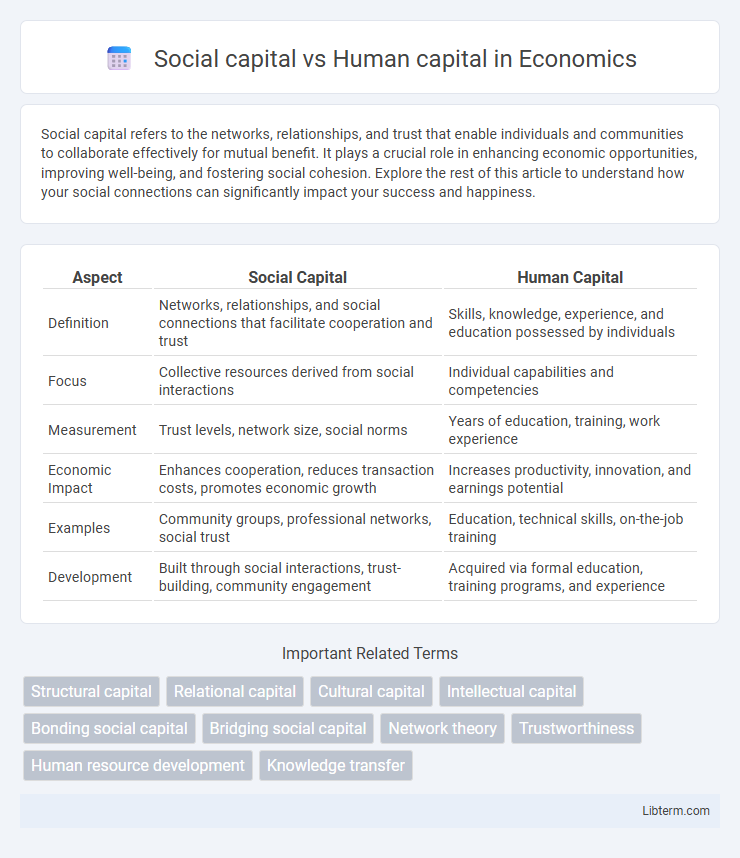Social capital refers to the networks, relationships, and trust that enable individuals and communities to collaborate effectively for mutual benefit. It plays a crucial role in enhancing economic opportunities, improving well-being, and fostering social cohesion. Explore the rest of this article to understand how your social connections can significantly impact your success and happiness.
Table of Comparison
| Aspect | Social Capital | Human Capital |
|---|---|---|
| Definition | Networks, relationships, and social connections that facilitate cooperation and trust | Skills, knowledge, experience, and education possessed by individuals |
| Focus | Collective resources derived from social interactions | Individual capabilities and competencies |
| Measurement | Trust levels, network size, social norms | Years of education, training, work experience |
| Economic Impact | Enhances cooperation, reduces transaction costs, promotes economic growth | Increases productivity, innovation, and earnings potential |
| Examples | Community groups, professional networks, social trust | Education, technical skills, on-the-job training |
| Development | Built through social interactions, trust-building, community engagement | Acquired via formal education, training programs, and experience |
Understanding Social Capital
Social capital refers to the networks, relationships, and social interactions that enable individuals and groups to access resources and support, fostering trust and cooperation within communities. Unlike human capital, which focuses on individual skills, knowledge, and experience, social capital emphasizes collective value derived from social connections. Understanding social capital involves recognizing its role in enhancing economic opportunities, facilitating information flow, and strengthening community resilience.
Defining Human Capital
Human capital refers to the economic value of an individual's skills, knowledge, and experience, which directly contribute to their productivity and potential for earning income. It encompasses education, training, health, and abilities that enhance an individual's capacity to perform work and generate economic output. Investing in human capital improves workforce quality and drives innovation, competitiveness, and long-term economic growth.
Key Differences Between Social and Human Capital
Social capital refers to the value derived from social networks, relationships, and trust within a community or organization, enhancing collaboration and information flow. Human capital encompasses individual skills, knowledge, education, and experience that drive productivity and economic value. While social capital emphasizes collective resources and social interactions, human capital focuses on personal attributes and capabilities that contribute to performance.
The Role of Networking in Social Capital
Networking plays a crucial role in social capital by facilitating trust, reciprocity, and information exchange among individuals and groups. Unlike human capital, which emphasizes individual skills and knowledge, social capital leverages relationships and social networks to create collective value and opportunities. Effective networking enhances access to resources, support, and influence, driving collaboration and innovation within communities and organizations.
Education and Skills in Human Capital
Human capital, defined by education and skills, represents the individual's knowledge, expertise, and competencies acquired through formal schooling and training, crucial for economic productivity and innovation. Social capital encompasses the networks, relationships, and social interactions that facilitate cooperation, trust, and access to resources beyond individual capabilities. While human capital emphasizes personal development through education and skills, social capital highlights the importance of social connections and community engagement in achieving collective goals.
How Social Capital Influences Career Success
Social capital enhances career success by providing access to networks, resources, and information critical for job opportunities and professional growth. Strong social connections facilitate mentorship, sponsorship, and collaborations that amplify human capital effectiveness. Leveraging social capital leads to increased trust, reputation, and influence within industries, directly impacting career advancement.
Measuring Social and Human Capital
Measuring social capital involves evaluating the networks, trust, and norms that facilitate cooperation within a community, often quantified through surveys assessing social ties, reciprocity, and civic engagement. Human capital measurement focuses on individuals' knowledge, skills, health, and education levels, typically assessed via educational attainment, work experience, and productivity metrics. Both capital types are critical for economic development, with social capital emphasizing relational assets and human capital highlighting personal competencies and capabilities.
Social Capital in the Digital Age
Social capital in the digital age thrives on online networks, social media platforms, and virtual communities that enhance trust, collaboration, and information sharing among individuals and organizations. Unlike human capital, which centers on individual skills and knowledge, social capital leverages collective relationships and social connections to create value and drive innovation. Digital tools amplify social capital by facilitating rapid communication, expanding reach, and enabling diverse, global interactions that strengthen social cohesion and economic opportunities.
Enhancing Human Capital for Economic Growth
Investing in human capital through education, skills training, and healthcare significantly boosts economic growth by increasing workforce productivity and innovation capacity. Social capital complements this by fostering networks and trust, facilitating cooperation that amplifies the benefits of enhanced human capital. Prioritizing comprehensive human capital development strategies drives sustainable economic advancement and competitiveness in global markets.
Integrating Social and Human Capital for Organizational Performance
Integrating social capital--networks, trust, and relationships--with human capital, including employee skills and knowledge, enhances organizational performance by fostering collaboration and innovation. Companies leveraging strong social capital alongside skilled human capital experience higher productivity, knowledge sharing, and adaptive capabilities. This synergy creates a competitive advantage by aligning employee expertise with a supportive social environment that drives collective success.
Social capital Infographic

 libterm.com
libterm.com